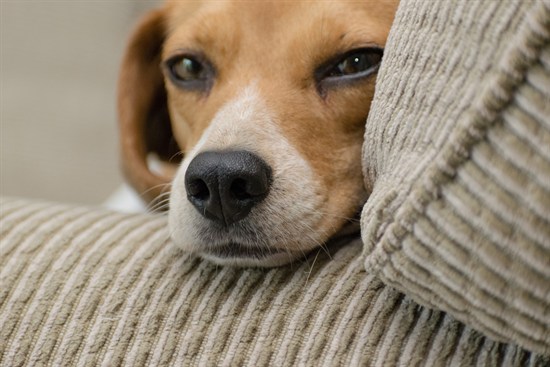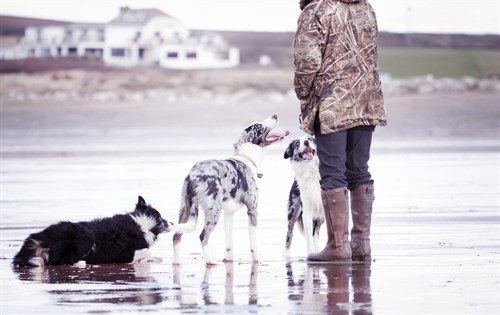Posted on 17/05/2018 by David
As a holiday cottage owner one of the questions you should be asking yourself is, should my property be dog friendly? Dog lover or not, it's a valid business question that has pros and cons for property owners.
If you're a dog lover yourself, you'll understand the urge to spend as much time as possible in the company of your four-legged best friend. It's a sentiment shared by pet owners the world over.
Even if you're not, you can't fail to appreciate the love and dedication owners have for their dogs, people who welcome these creatures as part of the family.
In 2017 one in four UK households owned a dog and, with canines firmly regarded as family members, they are frequently included in family holiday plans. Whether it’s arranging for them to be looked after in your absence or bringing the dog with you, pets are a big part of the holiday experience.
With few hotels or B&Bs permitting dogs, 'dog-friendly' holiday cottages have a real market advantage as they provide guests with exactly what they need. As you'll see, they can also provide owners with additional income and added security.
Accepting a dog in your holiday cottage opens up your property to a much broader market but there is some additional work involved.
Let's take a closer look at some of the things you need to think about when accepting dogs.

Dog-friendly holiday homes - what it means to you
Cleaning
You can put up all the 'keep off' signs you like, but dogs can't read so be prepared for some additional cleaning. It's unavoidable; dogs shed hair and they may even leave muddy footprints but responsible dog owners are usually quick to clean up any mess in left in their wake.
It's worth considering a few changes around the home to make things easier for you guests and cleaners:
Hard floors are easier to clean so consider these for any dog-friendly zones, such as the boot room/porch, kitchen, downstairs living area and other high-traffic communal areas. Hard floors can be swept and mopped quickly and do not accumulate dirt and hair like carpets can.
Being dog-friendly doesn't mean allowing pets the run of your property either. It's tricky but you're quite within your rights to restrict dogs to certain areas within your home, for example downstairs rooms only. Stair or baby gates are a good way of defining the dog-friendly zones inside your holiday cottage.
To discourage dogs from making themselves comfortable on furniture, provide a dog basket (or two) in a cosy spot - as pack animals dogs like to be with their owners. It's also a handy reminder to guests not to fall for those big brown eyes and let them up on the sofa!
As with defining dog-friendly zones within your property, you can also stipulate the number and size of dogs permitted within your home.
Leaving dogs unattended
In our experience, dogs rarely damage a property; however, we don’t allow owners to leave dogs alone in a property. Loneliness and anxiety, especially in a strange place, are the main reasons a dog would chew or mess. Most dog owners who care enough to take them on holiday would not dream of leaving them alone but it removes temptation, nonetheless.

Location
You might think your property isn't suitable for dogs and, while safety is paramount, most dogs and owners adapt well to their surroundings. A property fronting a busy road may put some off owners but most will weigh up the pros and cons - how close it is to a good walk or dog-friendly pub, for example.
If your property is situated in a rural location you'll need to consider the risks involved concerning dogs and livestock. An owner will never know if their dog is a sheep worrier until that horrific moment arrives. As a property owner, are you prepared to deal with this if it happens?
Also, if you as owners live onsite and have dogs of your own, you'll need to ask yourself, do they get on well with strange dogs or could it cause a problem?
Regardless of where your property is located, pay attention to outside areas and ensure gates and fences are kept in good order to discourage escape artists and accidents.
We also advise you to check that your insurance policy includes dogs staying at the property (some policies have this as a standard).
Allergies/preferences
Very few people ask us specifically for holiday homes that DO NOT allow pets (if they do, it's typically because of an allergy rather than anything else). The number of people with this request is very small in comparison to the amount of business you stand to gain by accepting dogs.
If you or your family have pet allergies then you’ll probably choose to offer a dog free cottage if you plan to use it yourself anyway.
If you are not a dog lover per se, this shouldn't stop you considering whether or not to let a dog-friendly property. Treat it as a business decision in the same way you might consider installing WiFi or a hot tub.
Should you own a dog-friendly holiday home?
As you can see, offering a dog-friendly cottage does not involve much more time or effort than offering a 'no dogs' cottage.
The key is to set out your ground rules at the start and to ensure your property is set-up properly to accept animals. It will restrict damage to you as an owner (both reputationally and in the home) and prevent harm to any animals that holiday there.
A dog-friendly cottage enjoys, on average, 10% more days booked that one that does not accept dogs. You may also get some added security out of the fact that dog-friendly properties tend to book out earlier than other types.
Whether you take dogs or not depends on your circumstances and personal preferences. Hopefully this has given some help making the decision.
If you do decide to take dogs it’s worth providing a few dog friendly features which will really help the guests, see our blog on kitting out dog friendly cottages.

